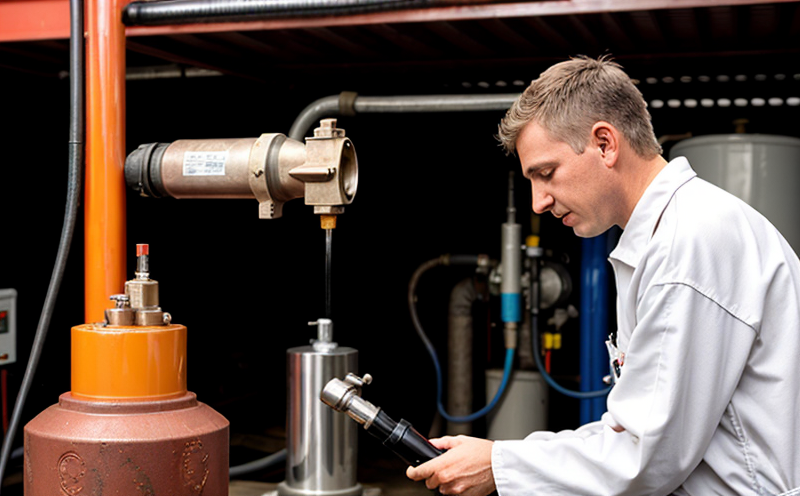ISO 8774 Trace Nitrogen Testing in Jet Fuels
The ISO 8774 standard is a critical component of fuel testing within the aerospace and aviation industries. This standard specifies the method for determining trace nitrogen content in jet fuels, which includes both gaseous (N2) and dissolved forms. Trace nitrogen can significantly impact the performance, stability, and safety of jet fuels during combustion processes.
The importance of this test cannot be overstated, especially given the stringent requirements for fuel quality in aerospace applications. Nitrogen content directly affects fuel's thermal stability, which is crucial to prevent deposit formation within engine components such as fuel nozzles and combustors. Excessive nitrogen can lead to corrosion, erosion, and reduced service life of aircraft engines.
The ISO 8774 method uses a combination of gas chromatography (GC) and thermal conductivity detection (TCD). This approach ensures the accurate measurement of trace nitrogen levels without interference from other components in fuel samples. The testing process involves precise sample preparation, where the jet fuel is degassed to remove dissolved gases before analysis.
The standard defines acceptance criteria for different types of jet fuels, which vary based on their intended use and performance requirements. For example, turbine engine fuels must meet specific nitrogen content limits to ensure optimal combustion efficiency and safety under high-pressure conditions. Compliance with these standards is essential not only for meeting regulatory requirements but also for maintaining the integrity and reliability of aircraft engines.
The testing process outlined in ISO 8774 ensures that jet fuel meets stringent quality control benchmarks, which are vital for the aviation industry's continuous operation and safety. By adhering to this standard, manufacturers can ensure their products meet not only current but also future regulatory standards, enhancing overall product performance and reliability.
Moreover, ISO 8774 trace nitrogen testing plays a crucial role in research and development (R&D) efforts aimed at improving fuel formulations. By understanding the exact levels of trace nitrogen present, R&D teams can refine their processes to minimize nitrogen content without compromising other critical fuel properties such as viscosity or thermal stability.
The test's precision is further enhanced by its ability to detect even minute amounts of nitrogen, which are significant in terms of overall fuel composition and performance. This level of accuracy is particularly important given the highly regulated nature of the aviation industry, where even small deviations from standard specifications can have substantial implications for flight safety and operational efficiency.
In summary, ISO 8774 trace nitrogen testing is an essential tool for maintaining the highest standards of fuel quality in the aerospace and aviation sectors. By ensuring compliance with this international standard, laboratories contribute to the overall reliability and safety of aircraft engines, thereby supporting the industry's commitment to excellence.
Applied Standards
- ISO 8774:2015 — This standard specifies the method for determining trace nitrogen content in jet fuels, including both gaseous and dissolved forms.
The ISO 8774 protocol is widely recognized and adopted by manufacturers, suppliers, and regulatory bodies worldwide. It provides a consistent methodology that ensures accurate measurement across different laboratories and testing facilities.
Benefits
- Enhanced Fuel Quality: Ensures compliance with international standards, thereby maintaining the highest quality of jet fuel.
- Safety Assurance: Reduces the risk of engine failure due to nitrogen-induced corrosion and erosion.
- Regulatory Compliance: Facilitates adherence to aviation industry regulations and standards.
- R&D Support: Provides precise data for fuel formulation improvements and process optimization.
Why Choose This Test
The ISO 8774 trace nitrogen test is an indispensable part of the quality assurance processes in aerospace and aviation industries. Its ability to accurately measure trace nitrogen levels ensures that jet fuels meet the stringent requirements set by international standards.
By choosing this test, laboratories can provide reliable, accurate data that supports safe and efficient aircraft operations. This precision is critical given the high stakes involved in aviation fuel quality—any deviation from standard specifications could lead to significant operational disruptions or safety hazards.
The test also offers a competitive advantage for manufacturers by ensuring they meet not only current but future regulatory standards. In an industry where continuous improvement and innovation are paramount, ISO 8774 compliance helps maintain a leadership position in the market.
Moreover, laboratories that offer this service can differentiate themselves by providing comprehensive quality assurance solutions tailored to the aerospace sector's unique needs. This expertise not only enhances customer satisfaction but also builds long-term relationships with industry stakeholders.





